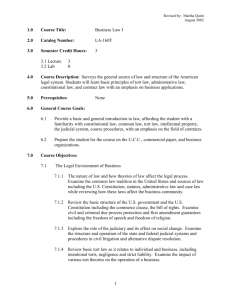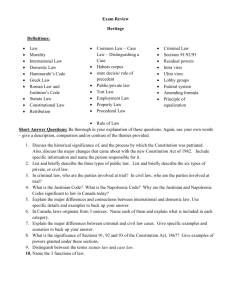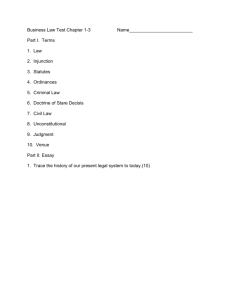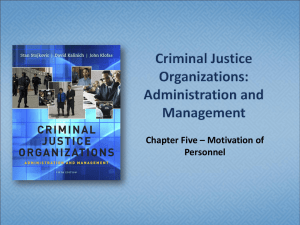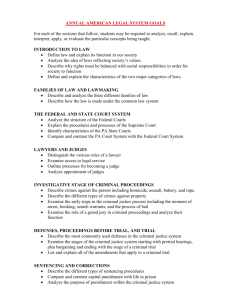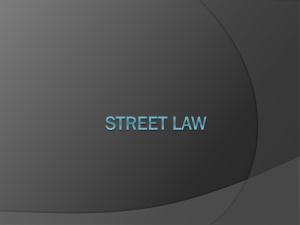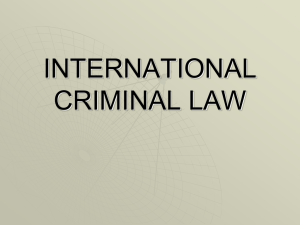Course Description
advertisement
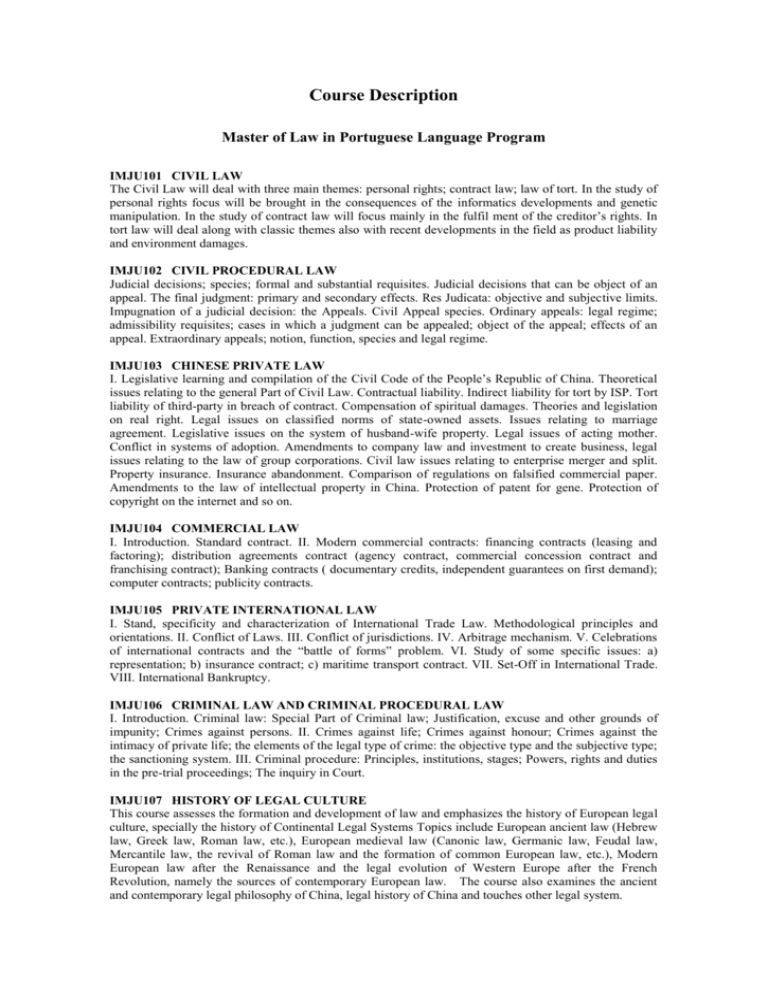
Course Description Master of Law in Portuguese Language Program IMJU101 CIVIL LAW The Civil Law will deal with three main themes: personal rights; contract law; law of tort. In the study of personal rights focus will be brought in the consequences of the informatics developments and genetic manipulation. In the study of contract law will focus mainly in the fulfil ment of the creditor’s rights. In tort law will deal along with classic themes also with recent developments in the field as product liability and environment damages. IMJU102 CIVIL PROCEDURAL LAW Judicial decisions; species; formal and substantial requisites. Judicial decisions that can be object of an appeal. The final judgment: primary and secondary effects. Res Judicata: objective and subjective limits. Impugnation of a judicial decision: the Appeals. Civil Appeal species. Ordinary appeals: legal regime; admissibility requisites; cases in which a judgment can be appealed; object of the appeal; effects of an appeal. Extraordinary appeals; notion, function, species and legal regime. IMJU103 CHINESE PRIVATE LAW I. Legislative learning and compilation of the Civil Code of the People’s Republic of China. Theoretical issues relating to the general Part of Civil Law. Contractual liability. Indirect liability for tort by ISP. Tort liability of third-party in breach of contract. Compensation of spiritual damages. Theories and legislation on real right. Legal issues on classified norms of state-owned assets. Issues relating to marriage agreement. Legislative issues on the system of husband-wife property. Legal issues of acting mother. Conflict in systems of adoption. Amendments to company law and investment to create business, legal issues relating to the law of group corporations. Civil law issues relating to enterprise merger and split. Property insurance. Insurance abandonment. Comparison of regulations on falsified commercial paper. Amendments to the law of intellectual property in China. Protection of patent for gene. Protection of copyright on the internet and so on. IMJU104 COMMERCIAL LAW I. Introduction. Standard contract. II. Modern commercial contracts: financing contracts (leasing and factoring); distribution agreements contract (agency contract, commercial concession contract and franchising contract); Banking contracts ( documentary credits, independent guarantees on first demand); computer contracts; publicity contracts. IMJU105 PRIVATE INTERNATIONAL LAW I. Stand, specificity and characterization of International Trade Law. Methodological principles and orientations. II. Conflict of Laws. III. Conflict of jurisdictions. IV. Arbitrage mechanism. V. Celebrations of international contracts and the “battle of forms” problem. VI. Study of some specific issues: a) representation; b) insurance contract; c) maritime transport contract. VII. Set-Off in International Trade. VIII. International Bankruptcy. IMJU106 CRIMINAL LAW AND CRIMINAL PROCEDURAL LAW I. Introduction. Criminal law: Special Part of Criminal law; Justification, excuse and other grounds of impunity; Crimes against persons. II. Crimes against life; Crimes against honour; Crimes against the intimacy of private life; the elements of the legal type of crime: the objective type and the subjective type; the sanctioning system. III. Criminal procedure: Principles, institutions, stages; Powers, rights and duties in the pre-trial proceedings; The inquiry in Court. IMJU107 HISTORY OF LEGAL CULTURE This course assesses the formation and development of law and emphasizes the history of European legal culture, specially the history of Continental Legal Systems Topics include European ancient law (Hebrew law, Greek law, Roman law, etc.), European medieval law (Canonic law, Germanic law, Feudal law, Mercantile law, the revival of Roman law and the formation of common European law, etc.), Modern European law after the Renaissance and the legal evolution of Western Europe after the French Revolution, namely the sources of contemporary European law. The course also examines the ancient and contemporary legal philosophy of China, legal history of China and touches other legal system. IMJP101 CONSTITUTIONAL LAW I. Fundamental rights conflicts. Conflicts and concurrence between rights as one of the main aspects of the fundamental rights system. Methodological obstacles. Examples. Basic notions. The Conflict of rights and the internal and external theories of fundamental rights limits. Basic postulates of the internal theory. II. Fundamental rights conflicts in the Media. IMJP102 ADMINISTRATIVE LAW I. Research on the development of the relation between the Public Administration and other powers, in the light of public good and fundamental rights defense. Public Administration and the rule of law. Principles of Administrative Law and their new development. Administrative act, classification of administrative acts, determinative nature of administrative act and its enforcement. Administrative litigation. II. Portuguese Urban Law and Macanese Urban Law. Characterization of the main Urban plans, and principle aspects of Macao Urban plan. Study of the main legal instruments in urban management. IMJP103 CHINESE CONSTITUTIONAL LAW Present status, major issues and future of the research of the theories of constitutional law in China; development and prospect of constitutional law and the history of constitutional politics in China; basic theories and principles of Chinese constitutional law; the political system in China – characteristics, content and roles of the people’s congresses and improvement, principles and roles of the system of election, relationship between the political parties and the state; the structure of the state, national autonomous government and the system of special administrative regions in China; characteristics and content of the system ob basic rights and responsibilities of Chinese citizens and theories of human rights; organization, functions, powers, principles of operation and relationship in state institutions of China, their reform and improvement; theories and practice of the implementation of China’s constitutional law, the system of guarantees, construction of constitutional law, amendments and supervision; the Constitution and the Basic Law of the SARs. IMJP104 PUBLIC INTERNATIONAL LAW Theories on international law; New development of international law; Sources of international law; Relations between international law and domestic law; Subjects of international law; Responsibilities of states; International human rights; Law of treaties; Law of international organizations; Resolutions of international disputes. IMJP105 ECONOMIC LAW Definition; objects and general principles of economic law in Macau and its relations with other disciplines of studies. Legal research on economical administration, organization and market; improvement in foreign related investment law; importation of specialized professionals and investment; comparisons of laws on the gambling industry and management; comparisons of rules on tourism and entertainment; research on legal issues in house construction and mortgage, financial loans, auditing and inspection, industrial and commercial trade, system of taxation, natural resources, requisition of assets and other specific legal topics. IMJP106 CRIMINAL LAW AND CRIMINAL PROCEDURAL LAW I. Introduction. Criminal law: Special Part of Criminal law; Justification, excuse and other grounds of impunity; Crimes against persons. II. Crimes against life; Crimes against honour; Crimes against the intimacy of private life; the elements of the legal type of crime: the objective type and the subjective type; the sanctioning system. III. Criminal procedure: Principles, institutions, stages; Powers, rights and duties in the pre-trial proceedings; The inquiry in Court. IMJP107 HISTORY OF LEGAL CULTURE This course assesses the formation and development of law and emphasizes the history of European legal culture, specially the history of Continental Legal Systems Topics include European ancient law (Hebrew law, Greek law, Roman law, etc.), European medieval law (Canonic law, Germanic law, Feudal law, Mercantile law, the revival of Roman law and the formation of common European law, etc.), Modern European law after the Renaissance and the legal evolution of Western Europe after the French Revolution, namely the sources of contemporary European law. The course also examines the ancient and contemporary legal philosophy of China, legal history of China and touches other legal systems
